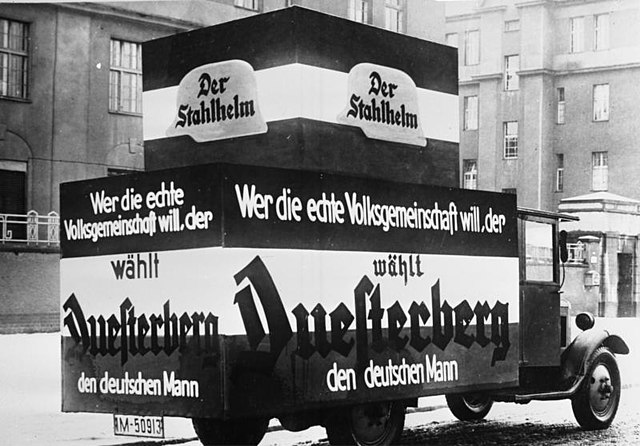Der Stahlhelm, Bund der Frontsoldaten
Der Stahlhelm, Bund der Frontsoldaten, commonly known as Der Stahlhelm, was a German First World War veteran's organisation existing from 1918 to 1935. In the late days of the Weimar Republic, it was closely affiliated to the monarchist German National People's Party (DNVP), placed at party gatherings in the position of armed security guards.
Franz Seldte in 1933
Der Stahlhelm propaganda car in Berlin promoting DNVP nominee Theodor Duesterberg for president of the German Reich in the 1932 election
Der Stahlhelm in uniform, c. 1934
Rank insignia 1933.
German National People's Party
The German National People's Party was a national-conservative and monarchist political party in Germany during the Weimar Republic. Before the rise of the Nazi Party, it was the major nationalist party in Weimar Germany. It was an alliance of conservative, nationalist, monarchist, völkisch, and antisemitic elements supported by the Pan-German League. Ideologically, the party was described as subscribing to authoritarian conservatism, German nationalism, monarchism, and from 1931 onwards also to corporatism in economic policy. It held anti-communist, anti-Catholic, and antisemitic views. On the left–right political spectrum, it belonged on the right-wing, and is classified as far-right in its early years and then again from the late 1920s when it moved back rightward.
A DNVP poster from 1920 showing a Teutonic knight being attacked by Poles and socialists as the caption reads "Save the East"
Clemens von Delbrück served as the DNVP's chief spokesman during the National Assembly that wrote the constitution of 1919.
Karl Helfferich, leader of the DNVP's Reichstag delegation 1919–1924, was well known for his abusive and abrasive style of politics which led to Chancellor Joseph Wirth to accuse him in 1922 on the floor of the Reichstag of moral responsibility for the assassination of Walther Rathenau.
Reinhold Wulle (left) was one of the leaders of the DNVP's völkisch wing in the early 1920s who walked out of the party in 1922.








